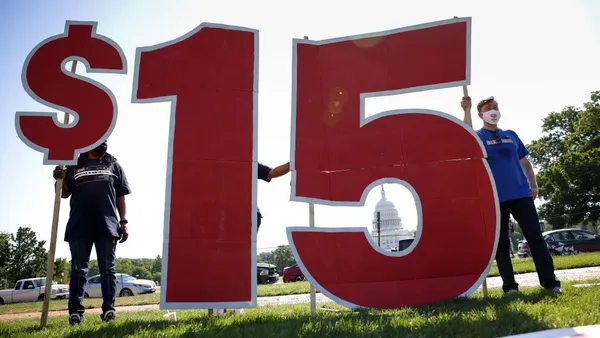Dive Brief:
- Starbucks will add a newly created assistant manager position at nearly all of its U.S. and Canadian locations. The deployment of these roles will follow a 62-store pilot program underway in Texas, Illinois and California, Sara Kelly, the brand’s chief partner officer, announced Tuesday.
- The chain hired 56 of the 62 pilot ASMs internally and will staff 90% of its retail leadership through internal hires across the next three years, Kelly said.
- In June, when Starbucks announced it planned to pilot the full-time ASM role, the brand had assistant managers at about 20% of its roughly 11,000 North American locations. The chain’s new ASM rollout could entail hiring or promoting upwards of 8,000 employees.
Dive Insight:
The ASM position roughly doubles the managerial presence in Starbucks stores. The chain’s typical cafe workforce consists of hourly baristas and shift supervisors under a salaried store manager; Starbucks didn’t immediately respond to a request to clarify if the full-time ASM role is salaried or hourly.
Kelly’s announcement didn’t detail the precise job responsibilities of the ASM, but said the new role will “give coffeehouse leaders more support to run the business, coach their teams and create great experiences for partners and customers.”
Kelly said locations with stable leadership saw stronger performance, and locations with long-tenured management had more baristas and shift supervisors who were ready for promotion to ASM.
Starbucks recently closed about 400 stores and laid off 900 corporate staff in an effort to rationalize its sprawling North American store system. That move incurred about $150 million in severance costs. Starbucks ended the fiscal year with roughly 11,050 North American stores, and in 2026 it will add “at least one ASM to nearly every coffeehouse across the U.S. and Canada.” Hiring thousands of full-time managers is a monumental undertaking, likely incurring significant salary and training costs.
The creation of a new position is similar to labor investments CEO Brian Niccol made in his later years at Chipotle, when the chain began adding an expeditor position between the assembly line and the cash register in many locations. Starbucks has said it is investing significantly in in-store labor as part of its turnaround plan. But the efficacy of the new ASM role in supporting store managers and developing talent could depend on how Starbucks handles the responsibilities of its existing store managers.
Niccol’s efforts to transform Starbucks include substantial investments — notably $150 million in renovations — coupled with major cuts, like the aforementioned store closures. In a July filing with the Securities and Exchange Commission, Starbucks said it was tying executive compensation to cost cutting first and to investments in stores, labor models and the customer experience second.













